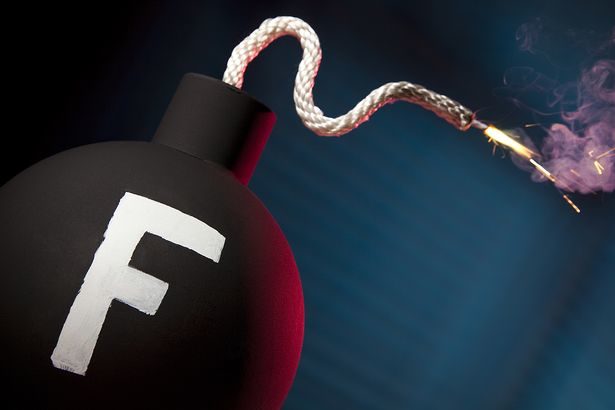
© Getty
It's official - swearing DOES help us tolerate pain, according to scientific research.
A study found using the F-word when pain strikes, increases pain tolerance by up to a third.A panel of experts including Keele University's senior lecturer in psychology, Dr Richard Stephens; language expert and author, Dr Emma Byrne; and acclaimed lexicographer Jonathon Green, explored how effective real and new, made-up swear words are in helping to increase pain tolerance and threshold.
The research was built on Dr Richard Stephen's original 2009 study which discovered that swearing can increase pain tolerance in the short term.
Nurofen, as pain relief experts, funded Dr. Stephens to further investigate whether the power of swearing could be emulated by a new 'socially acceptable' swear word.
The panel of experts developed two novel words for the experiment - 'twizpipe' and 'fouch' - to see if the public could use them in moments of pain instead of turning the air blue.
The group, containing scientists, lexicographers and lay members of the public who have suffered from pain, met to carefully consider and create the new words.
Jonathon Green, lexicographer and author of 'Green's Dictionary of Slang' said: "Slang has upwards of 1,000 swear words; still, there's always room for more.
"Our new word should be relevant, useful, inventive and if possible witty.
"A swear word doesn't spring from nowhere. It's also got to have the appeal that can propel it out of its origins into the larger linguistic world."
Language expert and panellist Emma Byrne, who helped create the two new words, said: "After long discussions, we decided Twizpipe and Fouch were the best socially acceptable swear words, as they mimic real swear words quite closely.
"Twizpipe mirrors the humorous element of swearing and is fun to say, whereas fouch is harsh-sounding and concise, similar to the existing four-letter swear word."
Volunteers were invited to test the new words, along with a traditional swear word and a control word while their hands were submerged in an ice water bath that tested their pain tolerance and threshold.
The new words did not alleviate pain in the same way traditional swearing did even though participants rated them as emotion evoking and humorous - showing traditional swear words are a better option for increasing pain tolerance.Dr Richard Stephens, senior lecturer of psychology, and lead investigator of the study, said: "It seems that swearing has a strong emotional connection, and this is likely due to the circumstances in which we first hear swear words.
"From a young age we typically learn to associate them with high-stress situations and that they are forbidden."The study found that these strong sentiments cannot be mimicked by newly created swear words."Although the words we created, twizpipe or fouch, were shown to be similar to existing swear words in that they were rated as emotion evoking and humorous, they didn't cut it when it came to pain relief -
repeating the f-word was the best option for increasing tolerance to pain."The volunteers rated the emotional impact of the f-word, as one and half times more emotional than the new words."
Experts are still not certain exactly what's behind the effect of swearing on pain, but they are beginning to know more.
Our deep-rooted emotional connection to swear words could be a reason why they help us to tolerate pain.
Abraham the Pharmacist added: "As a Pharmacist, I was interested to hear about this study as I'm always looking to learn about new ways that people can self-manage their pain.
"I hope the study findings will improve people's interest in pain and self-care, both of which are highly important healthcare issues.
"I encourage anyone who is experiencing pain to speak to their pharmacist about their treatment options."
Reader Comments
These so-called scientists need to watch Johnny Dangerously for credible alternative swear words.